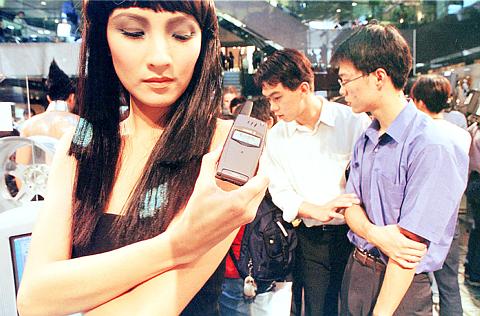Ericsson unveiled its T28sc mobile phone in Taiwan yesterday in efforts to save its sagging local market share.
"T28sc is one of six new models we plan to launch in the second half. We acknowledged that our sales didn't go well in the first half but it will change in the second half," said Arthur Huang (
In the first quarter, Ericsson's share of the mobile phone market place dropped from first place to fourth, following Nokia, Motorola and Sagem, according to the Chinese-language Commercial Times (

PHOTO: CHEN CHENG-CHANG, TAIPEI TIMES
In order to turn defeat into victory, Ericsson has decided to introduce new mobile phone models starting in the second quarter and continuing to early next year, with nearly NT$60 million to NT$100 million budgeted for advertising.
The launch of T18 model in July ignited the campaign. Nearly 80,000 units were sold one month after its debut. "We now regain the third place in the market. With more new models planned to be introduced to the market, we expect the sales will improve significantly in the second quarter," Huang said.
The T28sc, priced at NT$28,000 per unit, is the most slender Ericsson phone yet. It comes with advanced lithium polymer technology, which allows its battery to be the size of a credit card and enables users to carry a spare in their wallets.
The model will be available by the end of the month. Ericsson expects to sell 100,000 to 20,000 units in Taiwan this year.
As T28sc is being marketed as a high-end product, Ericsson presently has no plans to contract with a supplier to market the new model, though it doesn't rule out the possibility in the future, Huang said.
Besides T18 and T28sc, Ericsson T-10, priced at NT$10,000, also hit the market recently. The A-1018, priced at NT$7000 and R-250, which hasn't yet been priced, will be introduced to the market this year, said Steven Yeh (
In 1998, Ericsson sold 700,000 mobile phone units in Taiwan.

SETBACK: Apple’s India iPhone push has been disrupted after Foxconn recalled hundreds of Chinese engineers, amid Beijing’s attempts to curb tech transfers Apple Inc assembly partner Hon Hai Precision Industry Co (鴻海精密), also known internationally as Foxconn Technology Group (富士康科技集團), has recalled about 300 Chinese engineers from a factory in India, the latest setback for the iPhone maker’s push to rapidly expand in the country. The extraction of Chinese workers from the factory of Yuzhan Technology (India) Private Ltd, a Hon Hai component unit, in southern Tamil Nadu state, is the second such move in a few months. The company has started flying in Taiwanese engineers to replace staff leaving, people familiar with the matter said, asking not to be named, as the

The prices of gasoline and diesel at domestic fuel stations are to rise NT$0.1 and NT$0.4 per liter this week respectively, after international crude oil prices rose last week, CPC Corp, Taiwan (台灣中油) and Formosa Petrochemical Corp (台塑石化) announced yesterday. Effective today, gasoline prices at CPC and Formosa stations are to rise to NT$27.3, NT$28.8 and NT$30.8 per liter for 92, 95 and 98-octane unleaded gasoline respectively, the companies said in separate statements. The price of premium diesel is to rise to NT$26.2 per liter at CPC stations and NT$26 at Formosa pumps, they said. The announcements came after international crude oil prices

DOLLAR SIGNS: The central bank rejected claims that the NT dollar had appreciated 10 percentage points more than the yen or the won against the greenback The New Taiwan dollar yesterday fell for a sixth day to its weakest level in three months, driven by equity-related outflows and reactions to an economics official’s exchange rate remarks. The NT dollar slid NT$0.197, or 0.65 percent, to close at NT$30.505 per US dollar, central bank data showed. The local currency has depreciated 1.97 percent so far this month, ranking as the weakest performer among Asian currencies. Dealers attributed the retreat to foreign investors wiring capital gains and dividends abroad after taking profit in local shares. They also pointed to reports that Washington might consider taking equity stakes in chipmakers, including Taiwan Semiconductor

A German company is putting used electric vehicle batteries to new use by stacking them into fridge-size units that homes and businesses can use to store their excess solar and wind energy. This week, the company Voltfang — which means “catching volts” — opened its first industrial site in Aachen, Germany, near the Belgian and Dutch borders. With about 100 staff, Voltfang says it is the biggest facility of its kind in Europe in the budding sector of refurbishing lithium-ion batteries. Its CEO David Oudsandji hopes it would help Europe’s biggest economy ween itself off fossil fuels and increasingly rely on climate-friendly renewables. While